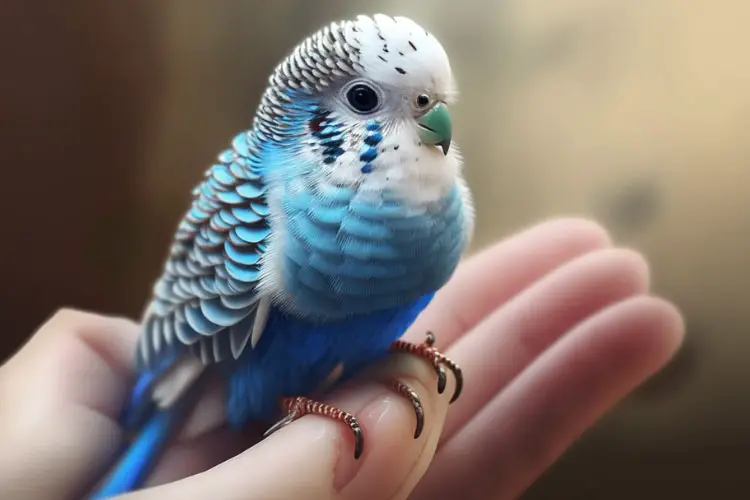If you’ve got a new budgie but are not sure how to earn its trust and form a strong bond with it, this guide is for you. Budgies are social creatures and want lots of interaction with their owners. However, a new budgie may feel nervous and uncomfortable around you unless you make it trust you.
The following article discusses tips and suggestions on how to bond with your budgie and create a strong relationship with it. Plus, you’ll discover the benefits of bonding with your budgie and how it promotes well-being of your budgie.
How to bond with your budgie
Here’s our list of top tips and tricks for bonding with your budgie and forming a strong relationship with it:
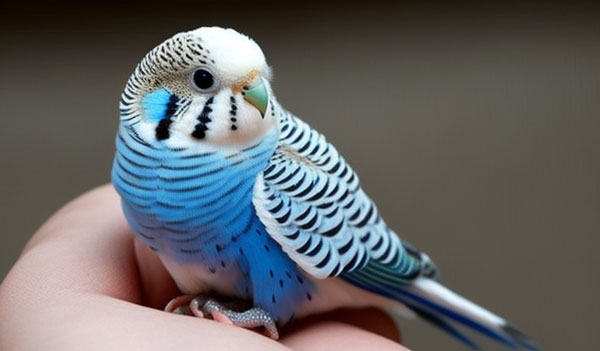
Interact with your budgie daily
As we said at the beginning of this article, budgerigars are social animals and require daily interactions with their owners to stay happy and healthy.
Through this daily interaction and socialization with your budgie, you’ll be making your bird see you as a friend and warm up to you.
If you notice that your budgie gets nervous whenever you approach its cage, set a few minutes every day to sit by its cage as you talk to it, or simply spend time with it.
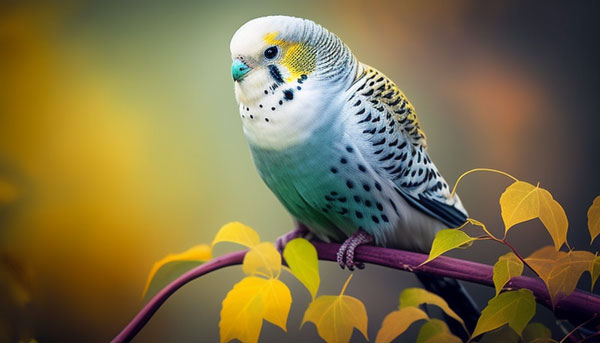
As your budgie become relaxed, you can put your fingers in its cage slowly. And then lightly pet it when you see if it’s comfortable with it
You can also hold your hand in the bird’s cage and let it perch on your finger.
With time, you can move on to cuddling and petting your budgie as you spend quality time together.
Hand-feed your feathered friend
Another trick that can draw your budgie closer to you is by hand-feeding it. This works better if you first eat the food and then look like you’re sharing it with your feathered friend.
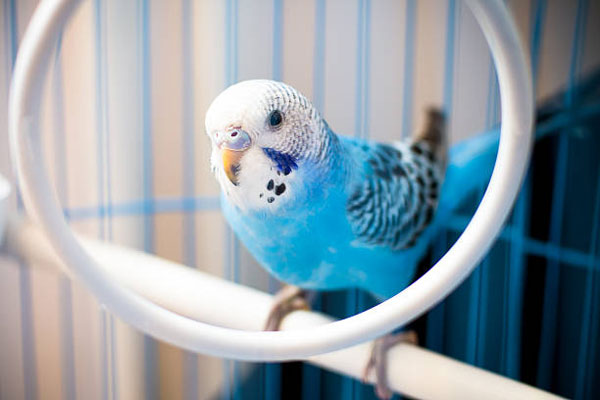
But be sure to only stick to bird-friendly foods such as sunflower seeds, pumpkin seeds, cashew nuts, apples, melon, leafy greens, carrots, broccoli, snap peas, etc.
Out-of-cage time can help
Taking your budgie out of the cage to enjoy the “outside” world can also help when trying to form a strong relationship with your bird.
This can give the bird the impression that you don’t want to hurt it and that it can safely move around.
Taking your budgie out of its encourage is also quite enriching and offers him the stimulation he requires to stay happy and healthy.
Play with your budgie
Playing with your budgie in various engaging activities brings both of you closer and helps make your bond even stronger.
You can do this by offering them a variety of toys in their cage, playing music at a low volume, singing to your bird, etc.
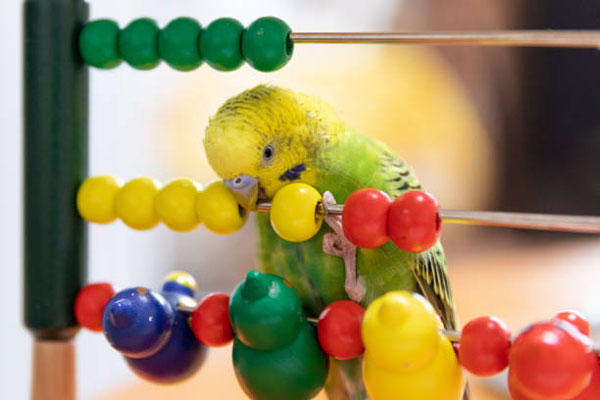
Also, you may consider carrying your budgie on your shoulder when it’s out of its cage. But make sure you leave the cage open in case your budgie feels the need to retreat back to its habitat.
Overall, spending quality time with your budgie will help create a strong friendship cemented with safety, comfort, and trust.
Give it special treats
Budgies like tasty treats such as fruits, veggies, etc. If you give them such, they’ll see you as a friend.
However, note that you should only offer your budgies treats moderately (about 1-2 times a week).
Stick to a healthy diet to ensure proper nutrition and keep your feathered friend healthy.
Talk to your budgie in a low voice
Talking to your budgie whenever you’re together will also help grow your friendship. But make sure you do so in a low and inviting voice.
Talk to your budgie softly to make it calm and relaxed.
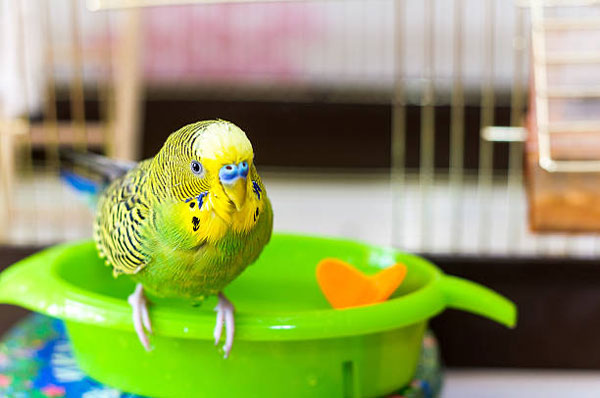
Loud noises are potential stressors for budgies and your voice isn’t an exception. If you shout at your budgie, it may become scared of you and start retreating from you.
Make your voice inviting as well to help make your budge more likely to intently listen to you whenever you speak.
Teach it new tricks
Training your budgie to do various tricks is another way you can develop strong bonds with it. Some of the common tricks to consider include teaching your budgie to wave, sit on your finger, balance on a ball, talk, sing, etc.
Groom your budgies
Grooming sessions for your budgie can also be a great opportunity for you to bond. Bodies usually groom each other whether in the wild or in captivity. And they may enjoy this attention from you as well.
You can try head scratching your budgie or gently petting him as he rests on your finger. You can also give him a bath in lukewarm water in a water bath or use a spray bottle for a mist bath.
Patience is key to forming a strong bond with your budgie
When it comes to bonding with your budgie, you’ll require lots of patience as it doesn’t happen instantly.
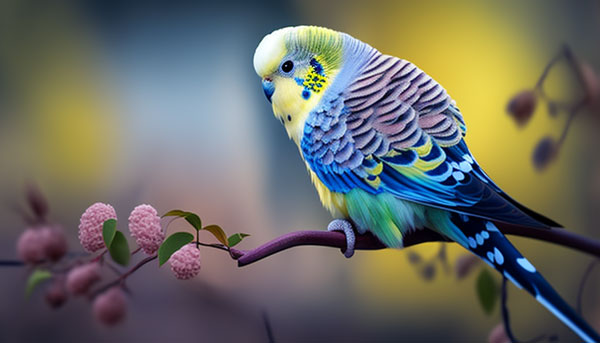
This is especially true if you’re dealing with a scared or stubborn budgie.
You’ll need to take time with your budgie and find what works for you as well as your budgie.
Over time, your budgie will learn that you’re a friend and will feel more relaxed and comfortable around you.
Benefits of bonding with your budgie
Bonding with your budgie is beneficial to your budgie in that it helps fight stress and anxiety. It also helps ensure better emotional and mental health for you and your budgie.
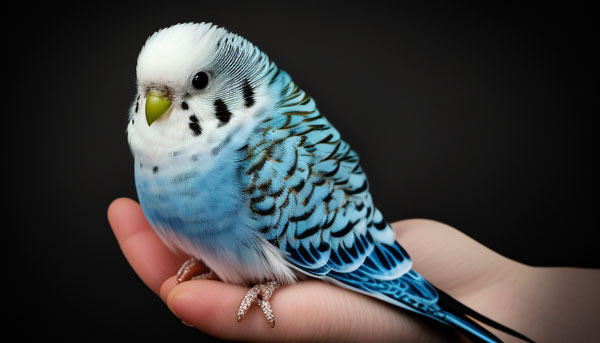
A strong bond with your budgie also translates to a more harmonious household setting and a sense of companionship will set in.
How to bond with a scared budgie
If you’re trying to bond with a scared budgie, then you’ll need to use a slightly different approach.
In the first days, you want to ensure you only approach your budgie from the front or sides but not from its rear.
Just spend time seated next to its enclosure and talk to it calmly. This will help make the budgie get used to your presence and voice.
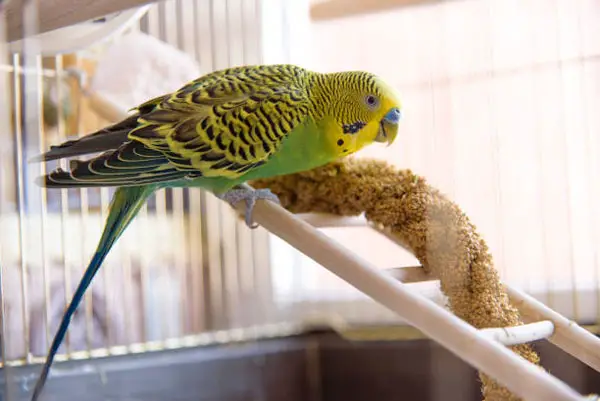
With patience and consistency, however, your budgie will eventually start warming up to you.
Once your bird is drawn closer to you, you can go ahead and open its cage and interact more closely with it.
How to tell if your budgie has bonded with you
Some tell-tale signs that you’ve bonded with your budgie include the bird chirping, talking, and whistling when you’re around.
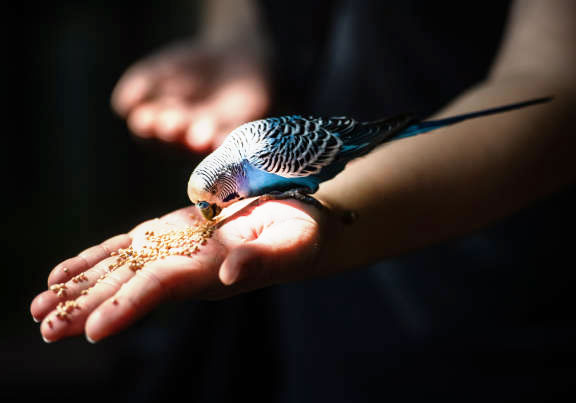
Your budgie singing and purring also mean he’s bonded with you.
Another sign is making various body movements such as tail wagging, flapping wings, bowing down for a head scratch, etc.
Final Verdict
Bonding with your budgie is necessary to make it feel happy and comfortable around you. The best way to achieve a strong bond with your budge is to interact with it daily, talk and sing to it, teach it new tricks, groom it, give it special treats, and get it out of its cage more often.
The bonding process won’t happen magically but takes a lot of time and effort. But with patience and consistency, a strong friendship will eventually blossom between the two of you. And your budgie will live a happy and stress-free life!
